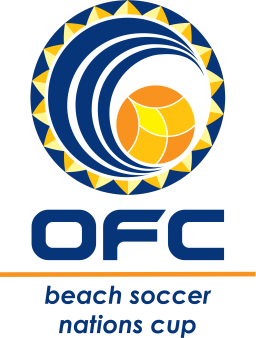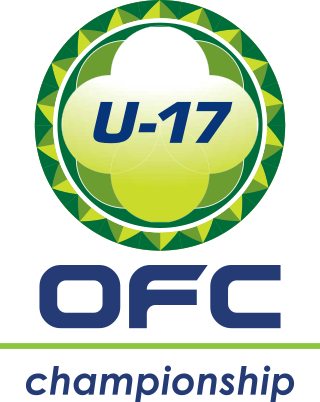
The OFC Beach Soccer Nations Cup is the main championship for beach soccer in Oceania, contested between the senior men's national teams of the members of the Oceania Football Confederation (OFC). It is the sport's version of the better known OFC Nations Cup in association football.
The 2012 OFC Nations Cup was the ninth edition of the OFC Nations Cup organised by the Oceania Football Confederation (OFC). The group stage of the tournament also doubled as the second round of the OFC qualification tournament for the 2014 FIFA World Cup. The four semi-finalists advanced to the final round of OFC qualifying, where they would compete for the OFC spot in the inter-confederation play-offs. The qualifying tournament was to be the football competition at the 2011 Pacific Games in Nouméa, New Caledonia. However, in June 2011 the format was amended, and the Pacific Games were no longer part of the qualification process. The new structure saw four of the lowest ranked entrants play a single round-robin tournament from 22 to 26 November 2011 in Samoa. The winner of this qualifying stage joined the other seven teams that received a bye to the Nations Cup proper.

The 2011 FIFA Beach Soccer World Cup was the sixth edition of the FIFA Beach Soccer World Cup, governed by FIFA. Overall, this was the 16th edition of a world cup in beach soccer since the establishment of the Beach Soccer World Championships which ran from 1995–2004 but was not governed by FIFA. It took place at the Stadio del Mare, a temporary stadium at the Marina di Ravenna in Ravenna, Italy, the third tournament to take place outside Brazil, which started on September 1 and ended on September 11, 2011. However this was the first tournament to take place under the new two year basis; now the FIFA Beach Soccer World Cup takes place once every two years. The tournament was confirmed in March 2010.

The 2013 FIFA Beach Soccer World Cup was the seventh edition of the FIFA Beach Soccer World Cup. Overall, this was the 17th edition of a world cup in beach soccer since the establishment of the Beach Soccer World Championships which ran from 1995–2004 but was not governed by FIFA. It took place from 18–28 September 2013 at Tahua To'ata Stadium in Papeete, Tahiti, French Polynesia and was the fourth tournament to have taken place outside Brazil. This was the second tournament to take place since the establishment of a longer two-year cycle of tournaments. This was also the first FIFA tournament held in a Pacific country other than New Zealand, and the first senior FIFA tournament took place in the region.
The 2011–12 OFC Champions League, also known as the 2012 O-League, was the 11th edition of the Oceanian Club Championship, Oceania's premier club football tournament organized by the Oceania Football Confederation (OFC), and the 6th season under the current OFC Champions League name. It was contested by eight teams from seven countries. The teams were split into two four-team pools, the winner of each pool contesting the title of O-League Champion and the right to represent the OFC at the 2012 FIFA Club World Cup.
The Tahiti national beach soccer team represents Tahiti or French Polynesia in international beach soccer competitions and is controlled by the FTF and the FFF, the governing body for football in Tahiti. In contrast to the fortunes of the association football team, Tahiti's beach soccer has, since 2011, been one of the strongest teams in world beach soccer. The team made history at the 2013 FIFA Beach Soccer World Cup by becoming the first Pacific nation to qualify for the knockout stages of an international FIFA tournament. At the 2015 FIFA Beach Soccer World Cup Tahiti beat Italy in a penalty shootout to become the first Pacific nation to ever make it to a final in a FIFA tournament. They followed this up with another appearance in the 2017 final.
The New Zealand men's national football team has competed in all ten editions of the OFC Nations Cup, and have won five times, the most recent coming in the 2016 tournament.
The 2013 OFC U-20 Championship was the 19th edition of the OFC Under 20 Qualifying Tournament, the biennial football championship of Oceania (OFC). The competition was held at two venues in Fiji, from the 21 to 29 March, with the winner qualifying as Oceania's representative at the 2013 FIFA U-20 World Cup.

The 2013 OFC Beach Soccer Championship took place from 31 August to 2 September 2013 on the grounds of the University of New Caledonia in Nouméa, New Caledonia. It acted as a qualifier for the 2013 FIFA Beach Soccer World Cup. This time around, a second OFC team qualified alongside Tahiti for the World Cup, due to the facts that Tahiti is the host of the World Cup and that the OFC is only supposed to have one representative.
The 2016 OFC Nations Cup was the tenth edition of the OFC Nations Cup, the quadrennial international men's football championship of Oceania organised by the Oceania Football Confederation (OFC). The tournament was played between 28 May and 11 June 2016 in Port Moresby, Papua New Guinea. The winner qualified for the 2017 FIFA Confederations Cup in Russia.
The 2016 OFC Futsal Championship was the 11th edition of the OFC Futsal Championship, the annual international futsal championship organised by the Oceania Football Confederation (OFC) for the men's national teams of Oceania. The tournament was held in Suva, Fiji between 8–13 February 2016.
The 2016 OFC U-20 Championship was the 21st edition of the OFC U-20 Championship, the biennial international youth football tournament organized by the Oceania Football Confederation (OFC) for players aged 19 and below. This year, the tournament was held in Vanuatu for the first time by itself.

The 2017 OFC U-17 Championship was the 17th edition of the OFC U-17 Championship, the biennial international youth football tournament organized by the Oceania Football Confederation (OFC) for players aged 17 and below. The tournament was held in Tahiti between 11 and 24 February 2017.
The 2018 OFC Women's Nations Cup was the 11th edition of the OFC Women's Nations Cup, the quadrennial international football championship organised by the Oceania Football Confederation (OFC) for the women's national teams of the Oceanian region. The tournament was held in New Caledonia between 18 November – 1 December 2018.
The 2018 OFC U-19 Championship was the 22nd edition of the OFC U-19/U-20 Championship, the biennial international youth football championship organised by the Oceania Football Confederation (OFC) for the men's under-19/under-20 national teams of Oceania. The qualifying stage was held in the Cook Islands between 26 May – 1 June 2018, and the final tournament was held in Tahiti between 5–18 August 2018.
The 2018 OFC U-16 Championship was the 18th edition of the OFC U-16/U-17 Championship, the biennial international youth football championship organised by the Oceania Football Confederation (OFC) for the men's under-16/under-17 national teams of Oceania. The qualifying stage was held in Tonga between 14 and 20 July 2018, and the final tournament was held in the Solomon Islands between 9–22 September 2018.
The 2019 OFC Beach Soccer Nations Cup was the sixth edition of the OFC Beach Soccer Nations Cup, the premier beach soccer tournament contested by Oceanian men's national teams, organised by the Oceania Football Confederation (OFC). The competition returns after a six-year absence.
The 2019 OFC U-19 Women's Championship was the 9th edition of the OFC U-19/U-20 Women's Championship, the biennial international youth football championship organised by the Oceania Football Confederation (OFC) for the women's under-19/under-20 national teams of Oceania. The tournament was held in the Cook Islands from 30 August to 12 September 2019.
The 2022 OFC Champions League was the 21st edition of the Oceanian Club Championship, Oceania's premier club football tournament organized by the Oceania Football Confederation (OFC), and the 16th season under the current OFC Champions League name.
The 2022 OFC U-19 Championship was the 23rd edition of the OFC U-19/U-20 Championship, the biennial international youth football championship organised by the Oceania Football Confederation (OFC) for the men's under-19/under-20 national teams of Oceania.




